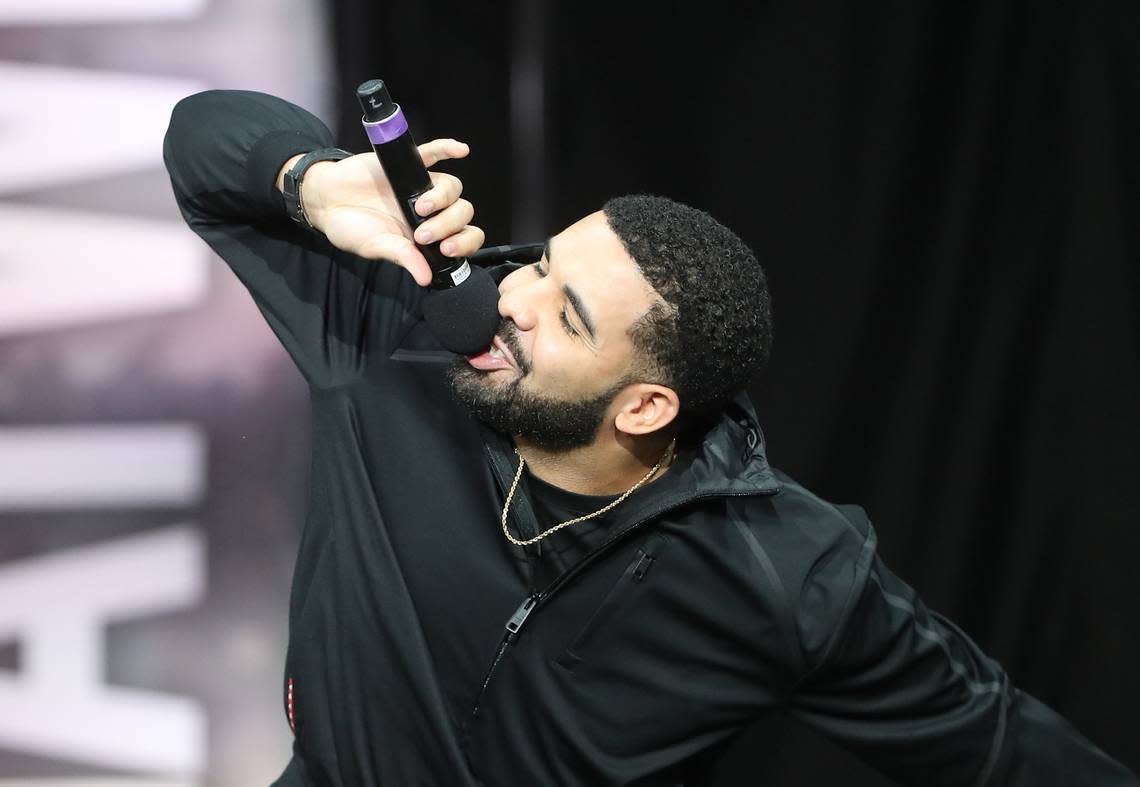Public opinion says Kendrick Lamar won epic ‘diss’ battle. Here’s my case for Drake | Opinion

- Oops!Something went wrong.Please try again later.
- Oops!Something went wrong.Please try again later.
I remember the first time I listened to Drake. I was in high school and he had just released his first studio album in 2010, “Thank Me Later.” I got to the fourth song, “Over” and was hooked. I had never heard anyone as clever with rhymes or as smooth and elegant while presenting them.
Before that moment, I didn’t feel connected to any artist but as a mixed-race person, I felt represented by Drake, who is also biracial. I not only enjoyed his music but identified with his personal experiences that were the inspirations for his art and showed me the beauty and power of music.
Opinion
This is one reason why the public battle between the 36-year-old Drake, a Canadian, and fellow rapper Kendrick Lamar has tested my loyalty to Drake, aka Drizzy.
The two Rap stars have accused each other of some pretty heinous things. Lamar, the 36-year-old from Compton has released numerous “diss” songs about Drake, accusing him of having an 11-year-old daughter and of being a pedophile. (For the uninitiated, a diss song is a personal expression of disrespect from the artist to the song’s subject.)
The other day, I overheard a gentleman in Midtown giving his opinion of the lyrical fight.
“Man, Drake lost that battle,” one person said. “He’s a predator.”
It took everything in me not to turn around and give this guy a piece of my mind.
This battle doesn’t carry the weight of entire regions like the East Coast vs West Coast beef of the 90s, but it features two men who are the current faces of modern hip-hop. It also signifies a rupture between two styles and subcultures that had coexisted begrudgingly until this conflict
The rappers had a rigid relationship for some time, but then Drake’s song “First Person Shooter,” from the album For All the Dogs, was released last October. In the track, featured guest J. Cole referred to himself, Drake, and Lamar as the “big three.” Lamar took exception in March when featured on Future’s “Like That” by rejecting that Drake and J. Cole were on his level. Lamar is a significant cultural figure who became the first rapper to win a Pulitzer Prize for music, in 2018, for his album DAMN.
In total, there have been nine diss tracks between Drake and Lamar in the last three weeks.
It could go down as one of the most polarizing beefs in hip-hop history and not just because of the high viewership.
Euphoria, one of Lamar’s diss tracks, set the record, previously held by Drake, for the most streams in a single day for any solo rap song in the first 24 hours after it dropped. In this song, Lamar aimed at Drake for being biracial by questioning his sexuality and just downright hating on him. “I hate the way that you walk, the way that you talk, I hate the way that you dress,” Lamar rapped.
As a long-time fan of Drake, even I can say, he was not ready for this onslaught of disses. Watching my favorite rapper go toe to toe with ”no holds barred” Lamar evoked Rocky Balboa standing helplessly while Ivan Drago killed Apollo Creed in Rocky IV. At some point, the towel must be thrown.
On May 7, days after Drake’s latest response to Lamar’s disses, police responded to a reported shooting outside the rapper’s mansion in Toronto. One of his security guards were seriously wounded by gunfire. The security guard has not been identified and Drake has not made a public statement on the subject.
A line in the sand
The vitriol between Lamar and Drake demonstrates the influence of hip-hop culture for better and worse.
Lamar chose to attack Drake by mocking his mixed-race heritage, and family. And calling him a pedophile was the uppercut in a brutal and quick combo. This wasn’t just to win a match, but to end Drake’s credibility and potentially his career. Lamar believes himself to be a torch bearer for hip-hop, a lyrical poet molded by a rough upbringing that included abuse and violence. This experience is a far cry from Drake’s, a former child actor living in the suburbs of Toronto.
The optimist in me hopes that these men and their divergent life experiences can coexist in hip-hop. These two different paths, as contrasting as they are, both led these artists to stardom. One does not define hip-hop better than the other. We shouldn’t try to exclude people from hip-hop based on who they are, we should accept them.
There is also irony in Lamar’s attacks on Drake. In a previous song, The Heart Part 5, he rapped “In a land where hurt people hurt people, [expletive] calling it culture.” Now he’s attacking another artist, calling him a pedophile.
If this beef continues, which all signs say it will, the real victim in this is the hip-hop culture. These two are giants currently in the industry. They don’t just rap, but they embody a style, a vibe.
As a mixed person, I felt that Lamar’s willingness to attack Drake for being biracial sets our culture back. Putting someone down for their background creates a culture of gatekeeping.
Hip Hop should respect individuality and accept everyone who takes part in it.

